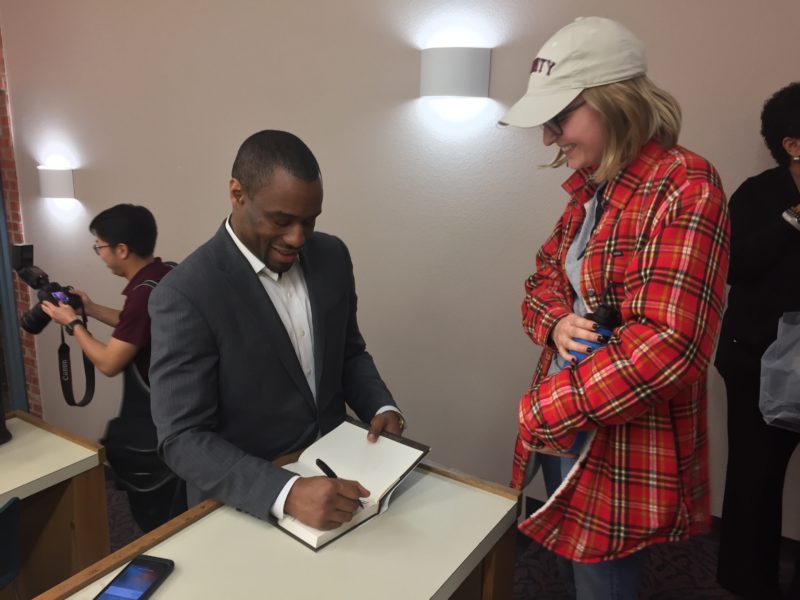Public intellectual Marc Lamont Hill addressed Trinity students and the San Antonio community in Laurie Auditorium last Thursday as part of an annual lecture series dually organized by the university and the city’s Martin Luther King, Jr. Commission. Hill’s keynote speech — titled “From Segregation to Social Justice: What Would Martin Say?” — celebrated the commission’s 30th anniversary along with Monday’s MLK, Jr. March.
Hill is a distinguished professor of African American studies at Morehouse College and host of BET News and VH1 Live. This was his second time speaking to Trinity University. His first visit was in 2011, when he also spoke for the MLK, Jr. Commemorative Lecture.
“[Since then,] we’ve seen radical changes in the economy,” Hill said in a private interview. “We’ve seen some repair, but we’ve also seen more and more jobs go overseas. We’ve seen more and more poor people become enmeshed in a state of precarity, a space where the government doesn’t protect you and they outsource everything to the private sector, which is designed to make money. So people are stuck without protection or investment.”
Hill noted that there has been important progress, noting the change in public discourse about transgender people, marriage equality legislation and the 2011 repeal of “Don’t Ask, Don’t Tell” military policy. He remained critical of activists on both the left and the right of American politics, however.
“I think the Obama administration brought a certain kind of hope, but it also ushered in a certain kind of complacency; I think there are people who would have spoken out against a Republican president who were scared to speak out against a Democratic president,” Hill said. “But in the midst of that, we saw a freedom movement emerge. We saw Black Lives Matter, we saw Occupy [Wall Street and] we saw a generation ignite and develop a new kind of worldview, a new kind of oppositional politics.”
Hill began his lecture by thanking San Antonio and Trinity for taking King seriously.
“I find no greater joy than in thinking together about this man, Martin Luther King, Jr., someone I regard as perhaps the greatest American we have ever produced.”
Hill discussed a litany of social and political issues facing America both in King’s time and our own, including imperialism, food insecurity, mass incarceration, poverty, prison reform and the war on drugs. He encouraged the audience to remain vigilant despite victories.
“We are able to imagine ourselves and our struggle as moving forward and progressing toward an inevitable or natural end,” Hill said. “We begin to see black success all over the place, we begin to see black progress all over the place, and when you see that much black progress, it can become easy and convenient to not see black misery. Dr. King’s legacy is to find the contradictions. The legacy of King isn’t just about feeling good. It’s not just about marching. It’s not just about saying we overcame. It’s about keeping track of the least of these.”
Hill emphasized the importance of youth engagement and a kind of discourse he called “deep listening.”
“King asked us to not only listen carefully [but] to discern wisely. We’ve got to ask different questions. King’s legacy is of action, analysis, work, struggle [and] prophetic vision. But King knew to ask different questions.”
Hill was particularly passionate on the value of joining movements bigger than oneself.
“We can show what is possible through our action. There are people who are hungry tonight, and we can feed them, we can act bravely tonight,” Hill said. “That is the legacy of King: to do something, to act, to join something. These are not individual actors; these are organizations. Join an organization — I didn’t say start one, I said join one.”
Hill echoed his criticism of partisanship during the lecture as well.
“We must be above the partisanship; we must engage in principles,” Hill said. “If you speak the truth when it is bitter, you will find yourself alone. The legacy of King is one of radical solitude. You will find yourself alone. But I don’t want you to be ashamed of being alone.”
The audience was invited to ask Hill questions following his keynote lecture. Questions included pushback from Republican students, the difficulty of engaging in deep listening when faced with anti-intellectualism and the necessity of providing alternatives in tandem with political criticisms.
Tahlar Rowe, junior political science and Spanish double major and president of Trinity’s Black Student Union, is a member of Trinity’s Martin Luther King, Jr., Committee, which selects each year’s lecturer and coordinates Trinity students’ involvement in the San Antonio MLK, Jr. March.
“My job was to reach out to the local churches and get them to attend the event,” Rowe said. “I was pretty much their liaison.”
Following the lecture, Rowe had only positive comments about Hill’s speech.
“It was great,” Rowe said. “I’m always mesmerized how he can inspire, yet critique each side. I walked away very inspired, but also a little conflicted; there are some things that I know I’ve been doing that haven’t been all so great. I know I haven’t been living up to [King’s] legacy, so I think sitting there was pretty mind-blowing, but it was also eye-opening.”
Junior biology major Cristian Vargas said that Hill was a great choice for speaker.
“His lecture was amazing,” Vargas said. “[He was] very passionate, very willing to engage audience members who didn’t necessarily agree with him.”







